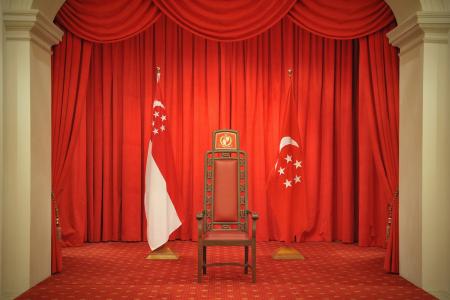Head of State: Appoint or elect?
Unbundle the two roles - custodial and ceremonial - of the President and return to the system of appointing a Head of State.
In suggesting this, the Constitutional Commission said the custodial powers could then be vested in an appointed body of experts.
But in its White Paper released yesterday, the Government said an elected custodial president is the "most workable and effective solution for Singapore" now.
"Whether the Government makes decisions with the President's concurrence, the President vetoes the Government's decision, or Parliament overrides the President's veto, it is always an elected institution that represents Singaporeans in making important decisions relating to our financial reserves and the integrity of the public service."
BALANCE
Commission: Custodial powers can be vested in a council of experts as a "second chamber of Parliament" that can delay measures, force a debate upon Parliament and require the Government to override objections with a super-majority vote (a situation where votes exceed 50 per cent).
By doing this, the council cannot veto or block government initiatives (unlike the Elected President at present, with the support of the Council of Presidential Advisers).
This strikes a suitable balance between the need to safeguard our critical assets and enabling the Government to act.
Government: It is important for the "second key" - the one who holds custodial powers - to not just be able to disagree with the Government but to be seen as legitimately doing so.
An appointed body of experts' inability to veto the Government's initiatives may be seen as lacking the democratic mandate to do so. This could impair the efficacy and rigour of the second key.
ROLES
Commission: When the President has to confront the Government over the reserves, it creates a conflict between his custodian and unifier roles.
Government: Despite this potential tension between the two roles, Singapore's elected presidents have performed the roles with distinction.
Of course, this depends on the nature, character and qualities of the Elected President. All presidential candidates must aspire towards playing both roles well.
ELECTION
Commission: A president has to be elected to have the required legitimacy to stand up to the Government. This means undergoing an intensely political and potentially divisive election process.
A painful and divisive election where candidates attack each other on issues could hurt the potential winner's role as a symbol of national unity.
Government: This tension can be mitigated, even if not entirely eliminated. The risk of presidential elections being politicised can also be dealt with, to some extent, through election rules.
The Commission's suggestion of imposing sanctions on those who breach election rules, for instance, is being studied.
Related stories:
Get The New Paper on your phone with the free TNP app. Download from the Apple App Store or Google Play Store now



